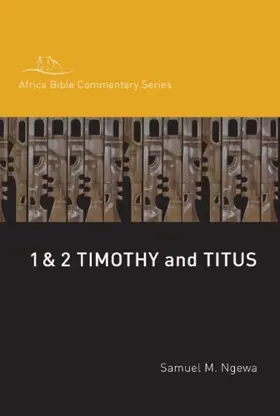

1 & 2 Timothy, Titus
in Hippo / Africa Bible Commentary Series
Pages
496 pages
Publisher
Hippo Books
Published
9/1/2009
ISBN-13
9789966805386
Collections
This book appears in the following featured collections.
- Non-Western Commentaries by Covenant Theological Seminary
- Non-Western and BIPOC Commentaries by Matt Quintana
Reviews
Offers a helpful non-Western perspective on the church issues addressed in the Pastoral Epistles.
[Full Review]
For full appreciation, Samuel Ngewa’s commentary on 1 and 2 Timothy and Titus needs to be located in the hermeneutics of the cultural climate that inspired it, as the author himself noted (xvii). In 2006, the Africa Bible Commentary, a one-volume commentary compiled by seventy African scholars from across the continent, of the Association of Evangelicals in Africa, was launched in Nairobi. It was intended to equip “pastors, students and preachers” with “a resource that would expound the Word of God in words that were intelligible to Africa” and thus enable them “to grasp the essential message of the gospel from Genesis to Revelation” (xix). The Africa Bible Commentary Series is a spin-off from this one-volume commentary. It aims to apply in greater depth to individual books of the Bible the life-centered and pastoral approach of the one-volume commentary. This is noted in both the foreword of Ngwega’s book by Solomon Andriat-simialomananarivo, Professor of Theology and Pastor at Abidjan (xix) and on the back dust jacket. Ngewa’s commentary on 1 and 2 Timothy and Titus (the Pastoral Epistles) is the first commentary of the series. These Pastoral Epistles are reportedly chosen to launch the series because they focus on church leaders and pastors who “need to examine themselves in the light of Scripture” so as “to lead the people of God in a way that conforms to Scripture” (xix). The rationale is that, if their faith and knowledge of Scripture is strong, that of the people they lead will equally be strong and vice versa.
[Full Review]

